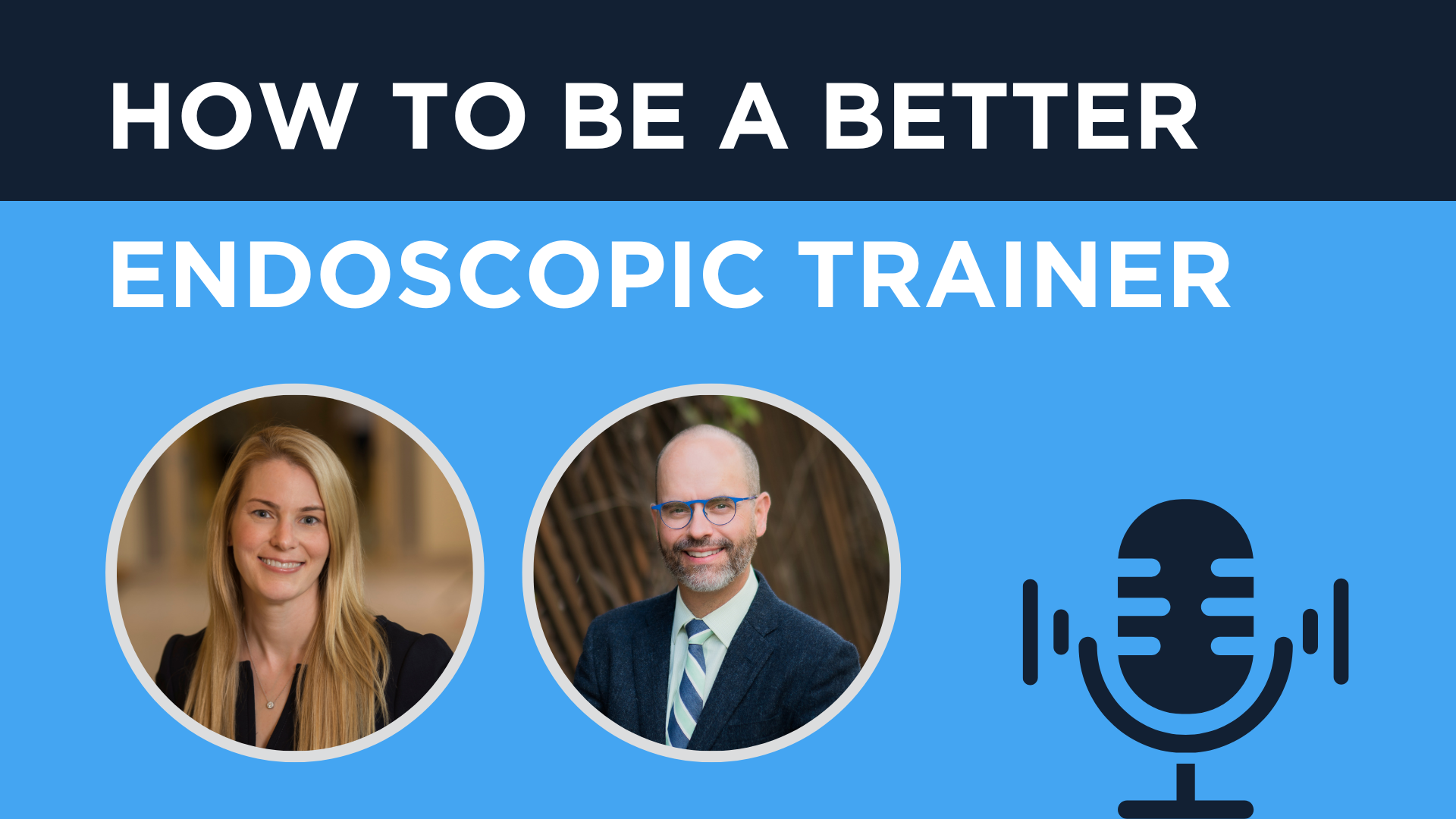In the latest episode of Small Talk, Big Topics, hosts Drs. Matthew Whitson and CS Tse welcome guests Drs. Catharine Walsh, associate professor of gastroenterology at the University of Toronto and Justin Sewell, associate professor at UCSF School of Medicine to discuss how to be a better endoscopic trainer.
Drs. Walsh and Sewell kick off the episode by recounting how they got started in endoscopy. Dr. Walsh was in medical education when she realized endoscopy was not taught as well as it could be. During her fellowship, she received her masters and PhD in education. For Dr. Sewell, he was told to teach endoscopy to other fellows. A year later he was invited to learn about education research, which sparked his interest in Cognitive Load Theory. He later received his PhD in education.
Drs. Walsh and Sewell dive right into whether there’s right or wrong ways to teach endoscopy. They argue that while there are many right ways to teach, educators need to be centered on the patient and fellow experience. It’s also important to be present and know what’s going on.
In Dr. Walsh’s experience, she watched what faculty did and picked up on that, but that led to her relearning how to teach endoscopy, which took a lot of effort. When teaching, educators must break down the scale and then teach it to trainees. Teaching endoscopy in itself is a primary challenge because it is a complex procedure with a long and flexible instrument inside a human body. The only feedback is the 2D view or how it feels in your hand. Since it’s challenging to describe how it feels, the experience doesn’t translate well from holding the scope to observing.
Dr. Sewell goes on to defines Cognitive Load Theory as the limits of the human working memory. What we can focus on at any moment is limited, and he saw this during endoscopy training. He watched the fellows become overwhelmed because their working memory was overloaded. Cognitive Load Theory applies not only to the trainees, but to the faculty as well. Faculty can also be overwhelmed by the patient, distractions, what’s going on in the room, etc., so it is important to set goals ahead of time to prevent being overloaded.
In learning the skill of endoscopy, teachers are in the automatic phase, which makes it hard to articulate what the difficulties and solutions are – unconscious confidence. Dr. Sewell reminds faculty about the value of conscious confidence and to keep an eye on the learner. Dr. Walsh talks about taking the time to speak to trainees, establish goals with them and see what level they are at. She asks them, “What have you been having difficulty with?” to gauge their current progress and lets the trainees be aware of goals to help engage them. The smaller skills are also more important in the procedure of endoscopy. Dr. Sewell talks about the importance of looking at the overall schedule and letting trainees know ahead of time if there are time restraints. When faculty sets expectations and let the trainees know ahead of time, they know what they expect and hopefully don’t experience negative emotions when you need to take the scope away.
Dr. Walsh also states she looks to avoid time-based goals with trainees and instead, to have them focus on the skills. She also describes this idea “stop to talk” where she tells trainees in advance that she will ask them to stop during the procedure to give feedback. She will stop trainees if they are in difficulty and have tried something 2-3 times, but also step in to stop them if they do something really well and ask them questions for interprocedural reflection. This fosters confidence and awareness for these trainees. Dr. Sewell concurs and also asks trainees how they feel or felt during the procedure.
Next, the guests discuss what to not do during a procedure as an endoscopy educator. Dr. Walsh states to not talk over the trainee because it’s overwhelming and to not ask them to describe findings. Keep feedback focused on goals and limit the amount of instruction. Dr. Sewell also says if you’re not talking, you’re paying better attention. He suggests talking less and using a pointer on the screen so the trainees don’t need to process what you are saying. The outcome of this movement is more effective for instruction. Dr. Walsh also recommends using common vocabulary and using a clock face in reference to direction in the procedure. They also say you need to explicitly sit down with the trainees after the procedure to highlight the key feedback.
To close out the episode, both share how successful programs have both classes to train endoscopy skills for trainees and for faculty. There is not an optimal amount of time for endoscopies with trainees. Their advice is to focus on learning and not on your performance compared to your fellow trainees. They also discuss good goals to set with trainees, along with the future of teaching endoscopy and their best advice for new teachers and trainees.
Connect with this episode's guests:
Follow with Catharine Walsh.
Follow Justin Sewell.












